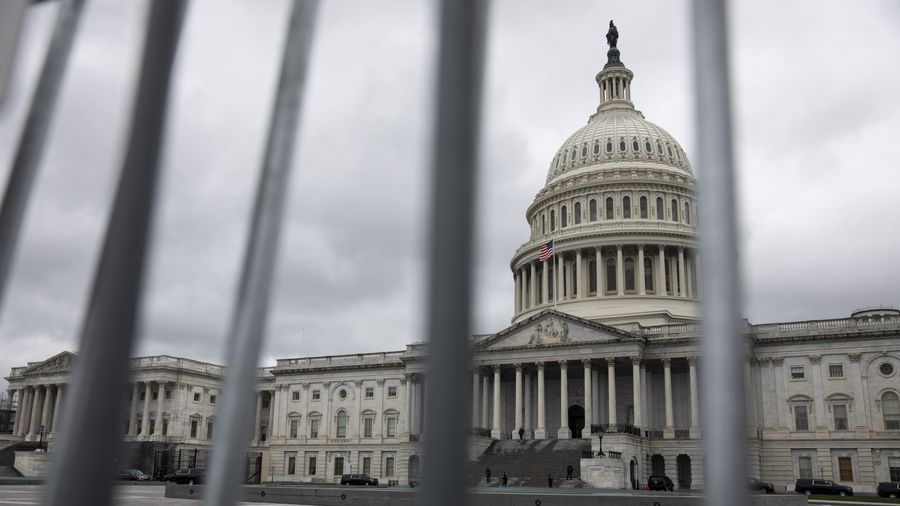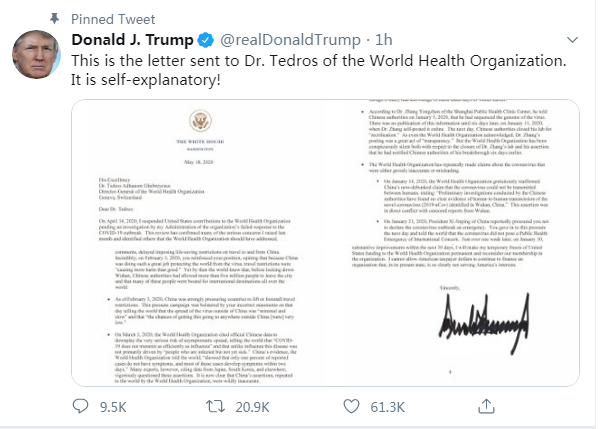
U.S. President Donald Trump threatened to permanently pull funding from the World Health Organization (WHO) if it does not commit to major substantive improvements in the next 30 days. In a letter to WHO Director-General Tedros Adhanom Ghebreyesus, Trump expressed his disappointment and made numerous unwarranted accusations against the WHO on its "repeated missteps" and its dependence on China.
The timing of the letter is noticeable when the World Health Assembly is convened and the Trump administration fails to control the COVID-19 that has killed more than 90,000 Americans as of late Monday.
The letter directly sends two clear signals. One is that it explains why the U.S. should suspend funding WHO before it could review and improve its policies and actions. Funding has been used by Trump as a leverage to ask for WHO "reforms" which serve American interest. Another one is that Trump again links WHO's "failure" with China, making China the scapegoat of the global pandemic.
The letter also reflects Trump's inner circle's dynamics and their commitment to the wrong tactics for fighting the pandemic. First, the nationalists in the White House are obviously gaining the upper hand, while the globalists are waning on every front.
At the very beginning of the Trump administration, there was still a fierce debate between nationalists and globalists on U.S. foreign policy, yet as many globalists left the government, the letter has marked a landslide victory for the nationalists in the internal argument on whether to support the WHO.
A few days ago, there were reports that the administration might consider restoring partial funding to the group, but finally the globalists in the White House were unable to persuade the president.

Screenshot of Trump's tweet of his letter to WHO Director-General Tedros Adhanom Ghebreyesus.
Secondly, by linking WHO's defects with China, the letter reflects that the Trump administration still perceives the global combat against COVID-19 in a way of great power rivalry, especially as part of its competition with China.
Many American politicians and scholars are hyping China's quest for world leadership or undermining the U.S.'s hegemony through the pandemic, suggesting China's "mask diplomacy" has more to do with its strategic intention.
The WHO, on the other hand, endorses China's policy of fighting against COVID-19. The U.S. thus has a sense of crisis, deeming that China's better performance in fighting the pandemic may weaken the U.S.'s global prestige. Discrediting China and the WHO has become U.S. tactics to win the unnecessary competition.
Thirdly, the WHO has become the focus of the Trump administration's attack, and only in this extreme way can the American people be more convinced that it is not Trump's fault. There are already different voices in the country to reflect on Trump's anti-pandemic policies.
Under such circumstances, in order to win the re-election, Trump must try his best to shake off the blame by criticizing other countries or groups. The WHO is a good target, and after several rounds of smearing, Trump can win some of the public's support by simply cutting the funding for the organization.
"America first" has become "America alone" in a more disgraceful manner. When Trump put forward the idea of "America first" in 2017, people questioned whether the U.S. would follow the path of unilateralism and some American officials denied.
However, choosing to threaten the WHO in the context of the pandemic, Trump proved again that the country has embarked on the wrong way alone. By doing so, the U.S. is squandering its strategic credibility.
Editor's note: Sun Chenghao is an assistant research professor at the Institute of American Studies, under the China Institutes of Contemporary International Relations based in Beijing. The article reflects the author's opinion, and not necessarily the views of CGTN.


